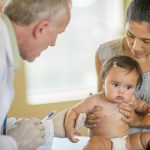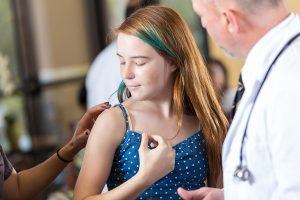Have you immunized your preteen against HPV? If not, now’s the time
As students in middle school receive immunizations for tetanus, diphtheria and meningitis, osteopathic physicians encourage parents to also get them vaccinated for human papillomavirus virus (HPV), some strains of which can cause cancers to develop later in life.
HPV vaccination rates currently stand at 63 percent in the United States, according to the Centers for Disease Control, which reports that 6 out of 10 girls, and only 5 out of 10 boys, have started the HPV vaccine series. The CDC recommends vaccinating preteen boys and girls at 11 or 12, when the vaccine produces a robust immune response, to protect them before HPV exposure occurs.
“HPV causes several kinds of cancer, and the HPV vaccine is effective at preventing most of them,” said Scott Cyrus, DO, an osteopathic pediatrician practicing in Tulsa, Oklahoma. “Still some parents are leery of letting their child get it, but it’s up to physicians to educate parents and advocate for preventative medicine.”
Parental objections
Dr. Cyrus says parents often object to the vaccine because their 11-year-old son or daughter isn’t yet sexually active, so they don’t need the vaccine. Others worry that getting vaccinated will send a message that the child has permission to become sexually active.
“I tell parents that a vaccine won’t change their child’s values but it can save their life. Also, I educate the child and explain that the vaccine does not protect against a number of other serious sexually transmitted infections, so it’s not a license for consequence-free sex,” said Dr. Cyrus.
Dr. Cyrus also reasons with parents that their children will eventually become sexually active and, at that point, it’s too late to get vaccinated. “Finally, I tell them I’ve had all five of my children vaccinated, which goes a long way to assure them of the vaccine’s safety and efficacy.”
Vaccinating girls and boys
Approximately 99 percent of cervical cancers are caused by high-risk HPV viruses that lead to abnormal cell changes, according to Octavia Cannon, DO, president-elect of the American College of Osteopathic Obstetricians and Gynecologists.
“The vaccine was an important step forward in women’s health because of the irrefutable link between cervical cancer and the HPV virus. What we now understand is that it has the potential to be as important for preventing devastating cancers in men,” Dr. Cannon explained. “Ten years of data have shown the vaccine to be safe and well-tolerated, so as osteopathic physicians we want our patients to take advantage of every opportunity to keep themselves healthy.”
I tell parents that a vaccine won’t change their child’s values but it can save their life. — Dr. Scott Cyrus, DO
Every year in the U.S., about 30,000 women and men are affected by cancers caused by HPV. The HPV vaccine is given in a series of two or three shots over the course of six months. Teens and young adults who did not begin or complete the series should do so immediately, according to the CDC.
Since the vaccine was first recommended in 2006, there has been a 56 percent reduction in vaccine-type HPV infections among teen girls in the U.S., even with very low HPV vaccination rates.
Which vaccine is it?
While three HPV vaccines have Food and Drug Administration (FDA) approval in the U.S.—Cervarix for girls only, Gardasil and Gardasil 9 for both girls and boys—only the Gardasil vaccines are currently available in the U.S.
All three vaccines help prevent infection by HPV-16 and HPV-18, which are responsible for most HPV-caused cancers. Gardasil also helps prevent infection by the two types of HPV (6 and 11) that cause most genital warts. Gardasil 9 helps prevent infection with the same types of HPV as Gardasil, plus 5 other high-risk types: 31, 33, 45, 52 and 58.
Common side effects of the HPV vaccine include pain, redness, or swelling in the arm where the shot was given; fever; headache or tiredness; nausea and muscle or joint pain. While uncommon, some patients experience brief fainting spells after vaccination. It is recommended that patients receive the vaccine while sitting or lying down and remain in that position for about 15 minutes after vaccination to help prevent fainting and injuries caused by falls.
Still undecided about immunization? The CDC offers this list of reasons for parents to get their child immunized against HPV.
6 reasons to get the HPV vaccine for your child
1. HPV is a common virus that infects men and women.
80% of people will get an HPV infection in their lifetime.
Most HPV infections will go away on their own. Infections that don’t go away can cause precancers and cancers.
2. HPV vaccination works.
Infections with HPV types that cause most HPV cancers and genital warts have dropped 71 percent among teen girls.
3. HPV vaccination prevents cancer.
More than 29,000 cases of cancers each year could be prevented with HPV vaccination.
Same as the average attendance for a baseball game.
4. Preventing cancer is better than treating cancer.
HPV infections can cause many types of cancer, but there is only cervical cancer screening.
HPV vaccination is prevention for the other types of cancer caused by HPV infections.
5. Your child can get the HPV vaccine when they receive the other preteen vaccines.
Three vaccines are recommended for 11- to 12-year olds to protect against the infections that can cause meningitis, HPV cancers, and whooping cough.
6. Preventing cancer is easier than ever before
Data now shows 2 doses of HPV vaccine provide similar protection to 3 doses when given before the 15th birthday.
Source: U.S. Department of Health and Human Services, Centers for Disease Control and Prevention

